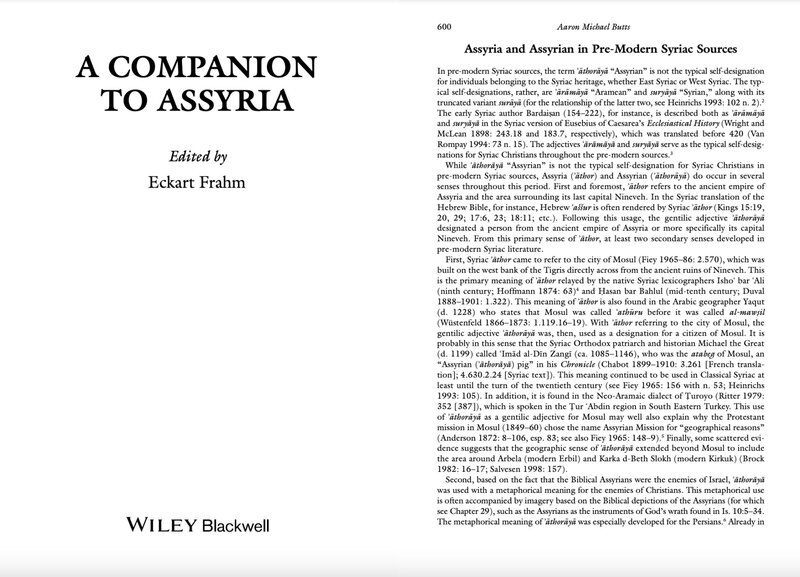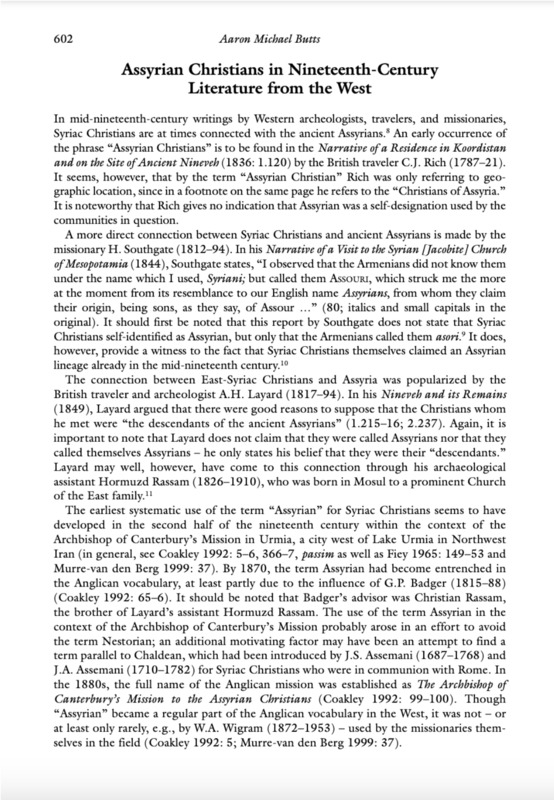-
Title
-
Assyrian Christians
-
Creator
-
Aaron Butts
-
Date
-
2017
-
Description
-
According to Aaron Michael Butts, pre-modern Syriac sources do not use “Assyrian” as a normal self-designation for Syriac Christians. The typical self-labels are Oromoyo (“Aramean”) and Suryaya/Suryoyo (“Syriac”), with Suryaya becoming the standard adjective for Syriac Christians across the period. By contrast, Assyria/Assyrian (Othur / Othuroyo) appears in two other senses: first, the biblical–historical meaning referring to the ancient empire and to places like Nineveh; and second, a geographical gentilic used locally, above all for people from Mosul and, by extension in some texts, the region around Arbela (Erbil/Kirkuk). A further, purely rhetorical use appears in Christian writing where “Assyrians” function metaphorically as enemies of Israel, echoing biblical imagery rather than communal self-naming.
Butts then traces how “Assyrian” became attached to Syriac Christians in nineteenth-century Western literature. Early travelers occasionally wrote “Assyrian Christians” merely to mean Christians in Assyria (e.g., C. J. Rich), and some outsiders (Armenians) used forms like Asouri for them. The tighter linkage of East-Syriac Christians with ancient Assyria was popularized by A. H. Layard, who argued they were the descendants of the ancient Assyrians—though he did not claim the communities called themselves Assyrian. The systematic use of “Assyrian” for these Christians developed in the second half of the nineteenth century around the Archbishop of Canterbury’s Mission in Urmia. Seeking an alternative to the stigmatized term “Nestorian” (and distinct from “Chaldean” for the Roman-Catholic branch), Anglican writers adopted “Assyrian”; by 1870 the term was entrenched in Anglican vocabulary, and the mission’s official name became “The Archbishop of Canterbury’s Mission to the Assyrian Christians.” From there it spread in the West, even if field missionaries did not all use it consistently at first. The upshot in Butts’s chapter is that “Assyrian” as a communal label for Syriac Christians is modern and externally driven, arising from nineteenth-century Western (especially Anglican) discourse rather than from pre-modern Syriac self-designation.
-
Language
-
English
-
Publisher
-
Aaron Michael Butts, Assyrian Christians, in Eckart Frahm (ed.), A Companion to Assyria, 2017, pp. 600 and 602
-
onlinelibrary.wiley.com




